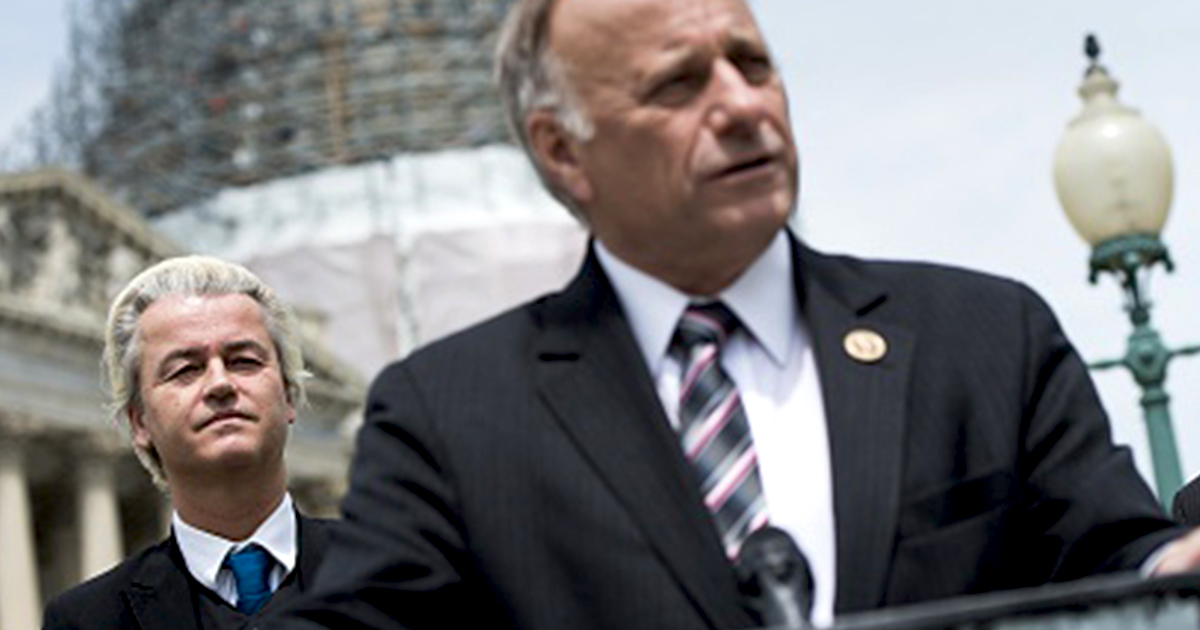Steve King's Statements About Diversity Reveal a Larger Movement

By:
Just 48 hours after suggesting that Americans "can't restore our civilization with somebody else's babies," Iowa Representative Steve King came under fire for suggesting that an increasingly diverse U.S. population will result in violence.
 Getty Images/Brendan Smialowski - gettyimages.com
Getty Images/Brendan Smialowski - gettyimages.com
During a radio interview with Jan Mickelson on 1040 WHO on Monday, the Republican pushed back against comments Univision's Jorge Ramos made about whites becoming a minority in the U.S, something the U.S. Census Bureau forecasted to happen by 2044. He accused Ramos and liberals of pitting people against each other.
"When you start accentuating the differences, then you end up with people who are at each other's throats, and he's adding up Hispanics and blacks that he predicts will be in greater numbers than whites in America," King said. "I will predict that the Hispanics and the blacks will be fighting each other before that happens."
King's statements highlight two specific strategies used to breed fear about the future of an increasingly diverse U.S. population and keep white Americans in the dominant class.
1. Divide and conquer.
Although he's accusing liberals of causing a racial divide, King's prediction that racial differences will make blacks and Hispanics fight each other harkens back to an old fear-mongering argument. His theory that blacks and Latinos will inevitably fight recalls the divide and conquer strategy the American elite used to keep poor white laborers and poor blacks at odds at the end of slavery. Slaveholders in the South feared the white labor movement, and instead of poor whites and enslaved blacks working together for a common interest in revolution they were put in competition for power.
"There seems here a clear common interest for the construction of a revolutionary coalition," wrote The Atlantic's Ta-Nehisi Coates. "Instead the opposite happened, and poor whites became the direct agents of enslavement themselves, working as overseers, slave-drivers and serving on slave-patrols."
2.King is appealing to a specific fear that white Christian Americans are under threat.
That same day on CNN's "New Day," King also doubled down on a tweet he posted over the weekend, claiming that the U.S. can't "restore" its society with"somebody else's babies," a comment that caused controversy because of its stark anti-immigrant sentiment, and its support of far-right Dutch candidate Geert Wilders. Wilders was convicted in the Netherlands of inciting discrimination against Moroccans by calling them "scum," and was also charged with inciting hate against Muslims in 2011, but was acquitted, according to CNBC.
Former Ku Klux Klan leader David Duke tweeted his support of King's tweet.
Civil rights icon Rep. John Lewis (D-Ga.) tweeted that the comments were "bigoted and racist," a label that King has previously rejected.
Republican Senator from Arizona Jeff Flake also condemned Kings' comments.
In addition to expressing a pessimistic view about diversity, King's recent statements also play into fears that as American birthrates decline, their populations will be outnumbered and overtaken by non-white immigrants.
In response to repeated questions from CNN's Chris Cuomo, King made the argument that his comments about "somebody else's babies"are not about race or white supremacy but about losing "the American culture," calling himself a "champion for Western civilization" and the English language.
King also touted his past speeches to German audiences, in which he warned about the combined dangers of declining German birthrates and increasing immigration.
His controversial comments touch on the fears expressed by the increasingly popular #whitegenocide hashtag, which George Washington University researchers define as the idea that "the white race is directly endangered by the increasing diversity of society."
Robert P. Jones the CEO of the Public Religion Research Institute told ATTN: in October last year that white working class Americans and white evangelical protestants, who were previously the majority, were more likely to say that discrimination against white people is a "big problem."
"Strong majorities of these groups believe that discrimination against whites has become as big a problem as discrimination against blacks and other minority groups," he said.
